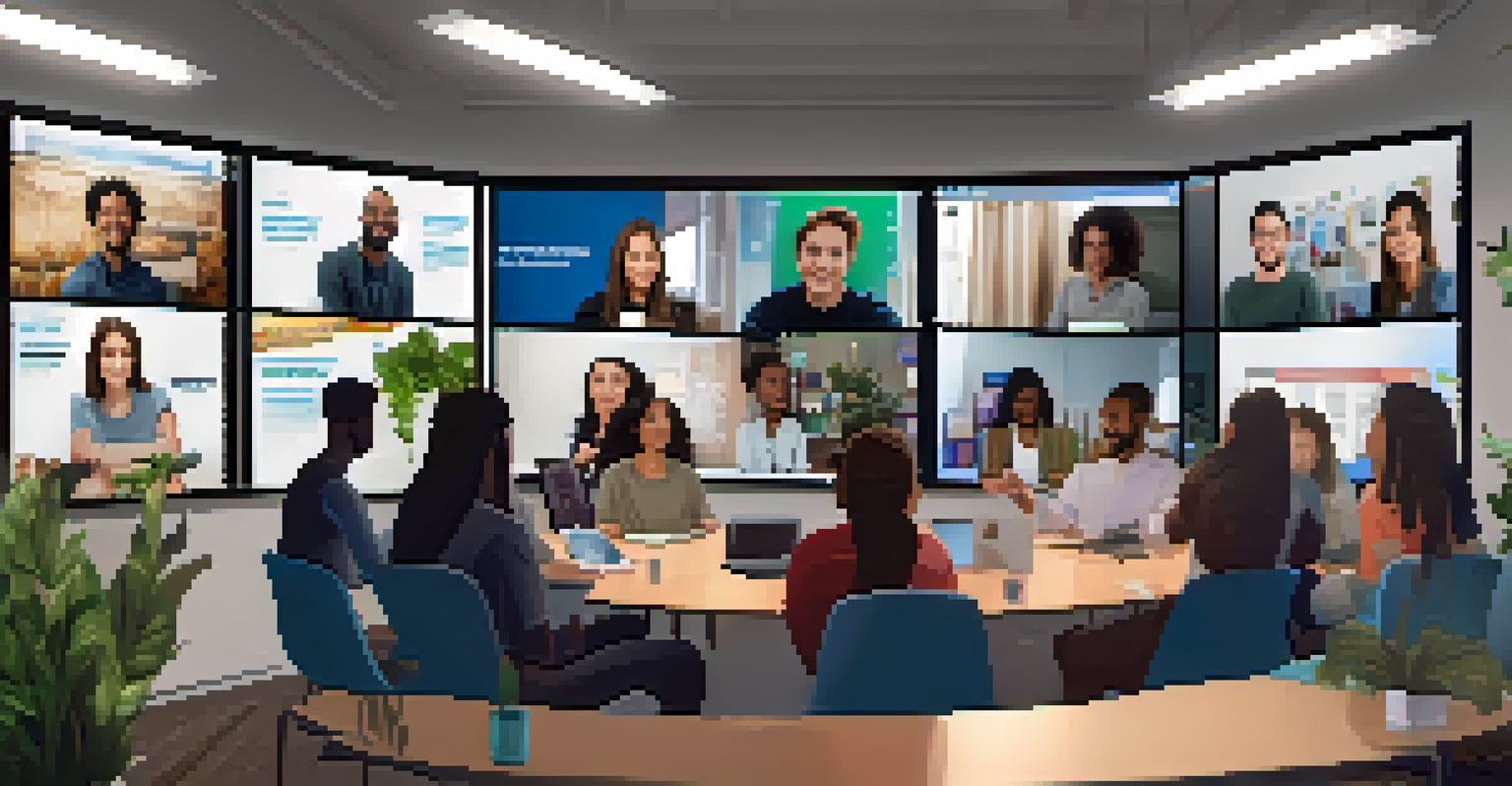Building Collaboration Skills in Online Learning Environments

Understanding the Importance of Collaboration in Learning
Collaboration is a key component of effective learning, especially in online environments. It allows students to share diverse perspectives, enhancing their understanding of complex topics. When learners collaborate, they don't just consume information; they engage with it, which leads to deeper retention and application.
Alone we can do so little; together we can do so much.
In the online realm, where face-to-face interactions are limited, collaboration becomes even more crucial. Students can develop essential skills like communication, teamwork, and problem-solving, which are vital in today's interconnected world. These skills not only benefit academic performance but also prepare students for future careers.
By fostering a collaborative atmosphere, educators can create a sense of community among students, even in virtual spaces. This sense of belonging can motivate learners to participate actively and support each other, making the online experience more enriching and fulfilling.
Setting Clear Goals for Collaborative Activities
Having clear, achievable goals is essential for successful collaboration in online learning. When students know what they are working towards, it helps them stay focused and engaged. These goals can range from completing a group project to mastering specific skills, providing a roadmap for collaboration.

Educators can encourage students to set their own goals as well, fostering ownership and accountability. For instance, a group could decide to improve their presentation skills through a collaborative project, ensuring that everyone is on the same page. This approach not only clarifies expectations but also empowers students to take initiative.
Collaboration Enhances Learning
Engaging in collaborative activities helps students share diverse perspectives and deepen their understanding of complex topics.
Moreover, regularly revisiting these goals during the collaboration process helps keep everyone aligned and motivated. Celebrating small achievements along the way can boost morale and reinforce the value of teamwork, making the learning experience more enjoyable.
Utilizing Technology to Enhance Collaboration
In today's digital age, technology plays a pivotal role in facilitating collaboration among online learners. Tools like video conferencing, shared documents, and discussion forums can create interactive spaces for students to connect and collaborate effectively. These technologies break down geographical barriers, allowing students from diverse backgrounds to work together.
Collaboration allows us to know more than we are capable of knowing by ourselves.
For instance, platforms like Google Workspace enable real-time collaboration on documents, encouraging students to brainstorm and edit together seamlessly. Similarly, virtual whiteboards can foster creativity during brainstorming sessions, making the collaborative process more dynamic and engaging. Utilizing such tools not only enhances interaction but also makes learning more enjoyable.
However, it's essential to choose the right tools that fit the group's needs and preferences. Educators should provide training and support to ensure all students can navigate these tools confidently, paving the way for productive collaboration. The right technology can transform the online learning experience into a collaborative adventure.
Fostering a Supportive Online Community
Building a supportive online community is crucial for nurturing collaboration among learners. When students feel safe and valued, they are more likely to share their ideas and contribute actively. Creating an inclusive environment where everyone’s voice is heard can significantly enhance collaborative efforts.
One way to foster this sense of community is through icebreakers and team-building exercises at the beginning of the course. These activities help students get to know each other and build trust, laying the foundation for effective collaboration. Additionally, regular check-ins can create a space for open communication, allowing students to express their thoughts and concerns.
Technology Boosts Group Work
Utilizing digital tools like video conferencing and shared documents facilitates effective collaboration among online learners.
Encouraging peer feedback is another effective strategy to strengthen community ties. When students provide constructive feedback to one another, it not only improves their collaboration skills but also cultivates a culture of respect and support. This collaborative spirit can transform the online learning experience into a vibrant, engaging journey.
Encouraging Active Participation and Engagement
Active participation is the lifeblood of successful collaboration in online learning. Educators can encourage engagement by designing interactive activities that require input from all group members. This could include group discussions, role-playing scenarios, or collaborative problem-solving tasks that demand teamwork and communication.
Moreover, assigning specific roles within a group can help ensure that everyone has a stake in the collaborative process. Whether a student is a facilitator, note-taker, or presenter, having defined responsibilities can motivate them to contribute actively. This structure not only fosters accountability but also allows each student to showcase their strengths.
Creating a culture of encouragement is vital as well. Recognizing and celebrating contributions, no matter how small, can boost confidence and motivate students to engage more deeply. By cultivating an environment where participation is valued, educators can enhance the overall collaborative experience.
Developing Conflict Resolution Skills
Conflict is an inevitable part of collaboration, but it's also an opportunity for growth and learning. Teaching students effective conflict resolution skills can empower them to handle disagreements constructively. This not only strengthens their collaboration skills but also prepares them for real-world interactions.
Educators can incorporate role-playing exercises to simulate conflicts and explore various resolution strategies. For instance, students could practice negotiation techniques or learn how to express their viewpoints assertively. By experiencing these scenarios in a safe environment, students can build confidence in managing conflicts.
Active Participation is Key
Encouraging active participation through defined roles and interactive activities fosters accountability and enhances the collaborative experience.
Moreover, fostering open communication is key to preventing conflicts from escalating. Encouraging students to express their thoughts and feelings openly can lead to a more harmonious collaborative experience. When students feel heard and respected, they are more likely to work through disagreements amicably.
Reflecting on Collaborative Experiences for Growth
Reflection is a powerful tool for enhancing collaboration skills in online learning. After completing a collaborative project, encouraging students to reflect on their experiences can provide valuable insights. This process allows them to identify what worked well, what challenges arose, and how they can improve in future collaborations.
Educators can facilitate this reflection by posing guiding questions, such as: What did you learn from your peers? How did you handle any conflicts? This structured reflection can help students internalize their learning and recognize the importance of collaboration.

Additionally, sharing reflections with peers can foster a culture of continuous improvement. By discussing their experiences, students can learn from one another and gain new perspectives on effective collaboration. This practice not only enhances individual growth but also strengthens the collaborative spirit within the community.